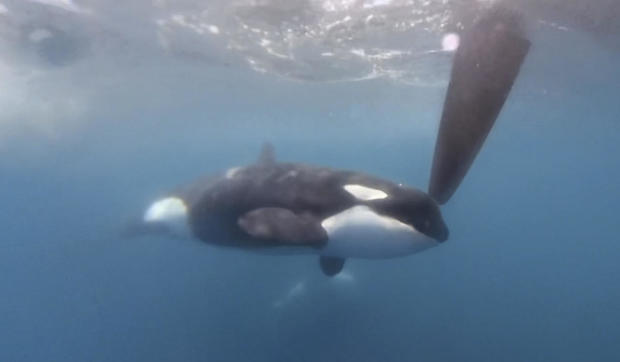Orcas disrupt boat race near Spain in latest display of dangerous, puzzling behavior
A pod of killer whales bumped one of the boats in an endurance sailing race as it approached the Strait of Gibraltar, the latest encounter in what researchers say is a growing trend of sometimes-aggressive interactions with Iberian orcas.
The 15-minute run-in with at least three of the giant mammals forced the crew competing in The Ocean Race on Thursday to drop its sails and raise a clatter in an attempt to scare the approaching orcas off. No one was injured, but Team JAJO skipper Jelmer van Beek said in a video posted on The Ocean Race website that it was "a scary moment."
"Twenty minutes ago, we got hit by some orcas," he said in the video. "Three orcas came straight at us and started hitting the rudders. Impressive to see the orcas, beautiful animals, but also a dangerous moment for us as a team."
Team JAJO was approaching the mouth of the Mediterranean Sea on a leg from the Netherlands to Italy when at least three orcas approached the VO65 class sloop. Video taken by the crew showed one of the killer whales appeared to be nuzzling the rudder; another video showed one of them running its nose into the hull.
Scientists have noted increasing reports of orcas, which average from 16-21 feet (5-6½ meters) and weigh more than 8,000 pounds (3,600 kilograms), bumping or damaging boats off the western coast of the Iberian Peninsula in the past four years.
The behavior defies easy explanation. A team of marine life researchers who study killer whales off Spain and Portugal has identified 15 individual orcas involved in the encounters — 13 of them young, supporting the hypothesis that they are playing. The fact that two are adults could support the competing and more sensational theory that they are responding to some traumatic event with a boat.
The sailors were warned of the hazard.
"We knew that there was a possibility of an orca attack this leg," Team JAJO on-board reporter Brend Schuil said. "So we had already spoken about what to do if the situation would occur."
Schuil said there was a call for all hands on deck and the sails were dropped to slow the boat from a racing speed of 12 knots. The crew made noises to to scare the orcas off, but not before it had fallen from second to fourth on the leg from The Hague to Genoa, where it is expected to arrive this weekend.
"They seemed more aggressive/playful when we were sailing at speed. Once we slowed down they also started to be less aggressive in their attacks," he said. "Everyone is OK on board and the animals are also OK."
The Ocean Race involves two classes of sailboats at sea for weeks at a time, with the IMOCA 60 boats competing in a six-month, 32,000-nautical mile (37,000-mile, 59,000-km) circumnavigation of the globe. Boats have already contended with a giant seaweed flotilla, catastrophic equipment failure, and a collision that knocked the leader out of the decisive seventh leg.
Although the race course navigates around exclusion zones to protect known marine habitats, there have been previous encounters with whales in The Ocean Race and other high-speed regattas.
However, they usually involve the boats crashing into the animals, and not the other way around.
One of the boats in the around-the-world portion of this year's Ocean Race triggered its hazard alarm after hitting what they suspected was a whale off the coast of Newfoundland in May; two crew members were injured in the collision. At the beginning of the 2013 America's Cup on San Francisco Bay, a whale was reported in the bay and organizers were prepared to delay a race if it wandered onto the course. In 2022, the start of SailGP's $1 million, winner-take-all Season 2 championship race on the same area of San Francisco Bay was delayed when a whale was spotted on the course.
In 2005, the first South African yacht to challenge for the America's Cup hit a whale with its 12-foot keel during training near Cape Town, stopping the 75-foot sloop dead in the water, injuring two crewmembers and snapping off both steering wheels.
___
AP Sports Writer Bernie Wilson contributed to this story.
___
AP sports: https://apnews.com/hub/sports and https://twitter.com/AP_Sports




